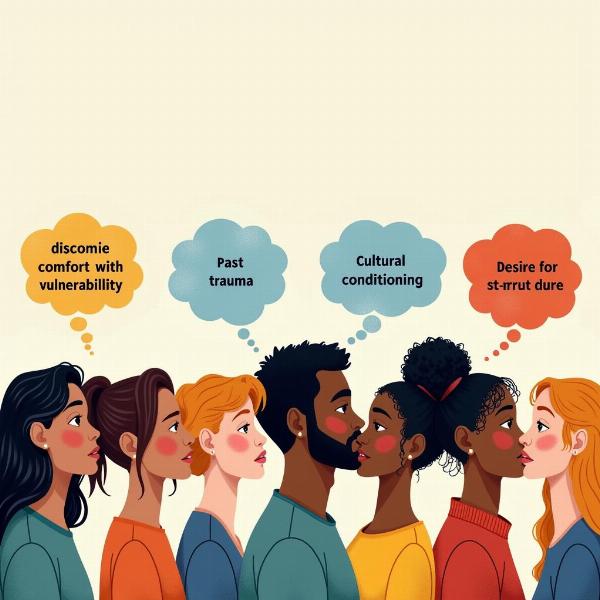The phrase “I hate tears” reflects a strong aversion to crying or witnessing tears. But what does this sentiment mean in Hindi, a language rich in nuance and emotional expression? This article delves into the various ways to express “I hate tears” in Hindi, exploring cultural contexts, synonyms, and the underlying emotions behind this common human experience. We’ll also examine how this phrase translates across different situations and relationships, providing you with a comprehensive understanding of its meaning and usage.
Expressing “I Hate Tears” in Hindi: Beyond a Literal Translation
Translating “I hate tears” directly into Hindi can sound unnatural. Instead, Hindi speakers often use phrases that convey the sentiment more organically. Some common expressions include:
- मुझे आँसू पसंद नहीं हैं (mujhe aansu pasand nahin hain): This is a literal translation, meaning “I don’t like tears.” While grammatically correct, it lacks the emotional intensity of “I hate tears.”
- मैं आँसुओं से नफ़रत करता हूँ / करती हूँ (main aansuon se nafrat karta/karti hun): This translates to “I hate tears,” using the word “nafrat” (hate). It’s a stronger expression, but still might not fully capture the intended meaning.
- मुझे रोना बिल्कुल पसंद नहीं (mujhe rona bilkul pasand nahin): This means “I don’t like crying at all.” It shifts the focus from tears themselves to the act of crying.
- मैं आँसू बर्दाश्त नहीं कर सकता / सकती (main aansu bardasht nahin kar sakta/sakti): Meaning “I can’t tolerate tears,” this emphasizes the speaker’s inability to bear the sight or experience of crying.
Cultural Context: The Significance of Tears in Indian Culture
In Indian culture, tears can hold multiple meanings. They can signify grief, joy, devotion, or even anger. Public displays of emotion, including crying, are generally more accepted than in some Western cultures. However, excessive crying might be seen as a sign of weakness, especially for men. Understanding these nuances is crucial to grasping the full meaning of “I hate tears” in a Hindi context.
Why Do People Say “I Hate Tears”? Exploring the Underlying Emotions
The aversion to tears can stem from various reasons:
- Discomfort with vulnerability: Tears often expose vulnerability, which some find uncomfortable to witness or experience.
- Personal experiences: Past traumas or negative associations with crying can lead to a dislike of tears.
- Cultural conditioning: Societal expectations and gender roles can influence one’s attitude towards crying.
- A desire for strength and resilience: In certain contexts, tears can be perceived as a sign of weakness, leading some to actively suppress them.
 Reasons for Disliking Tears
Reasons for Disliking Tears
I Hate Seeing My Loved Ones Cry: A Deeper Meaning
When someone says “I hate tears,” particularly regarding loved ones, it often reflects a deep empathy and desire to protect them from pain. This sentiment might be expressed in Hindi as:
- मुझे अपने प्रियजनों को रोते हुए देखना अच्छा नहीं लगता (mujhe apne priyajanon ko rote hue dekhna achcha nahin lagta): Meaning “I don’t like seeing my loved ones cry.”
- मैं अपने प्रियजनों के आँसू नहीं देख सकता / सकती (main apne priyajanon ke aansu nahin dekh sakta/sakti): Meaning “I can’t see the tears of my loved ones.”
Beyond Sadness: Tears of Joy and Other Emotions
It’s important to note that not all tears are associated with sadness. Tears of joy, relief, or even anger can also elicit the “I hate tears” response, particularly if they are perceived as excessive or overwhelming.
Conclusion: Understanding the Nuances of “I Hate Tears” in Hindi
“I hate tears” is more than just a simple statement. It encapsulates a complex range of emotions and cultural understandings. By exploring its various expressions in Hindi, we gain a deeper appreciation for the multifaceted nature of human emotion. Whether expressing personal discomfort, empathy for loved ones, or societal expectations, understanding the context and nuances behind this phrase is essential for effective communication.
FAQ
- What is the most common way to say “I hate tears” in Hindi? While a direct translation exists, phrases like “mujhe rona bilkul pasand nahin” (I don’t like crying at all) or “main aansu bardasht nahin kar sakta/sakti” (I can’t tolerate tears) often convey the sentiment more naturally.
- Is crying considered taboo in Indian culture? No, crying is not taboo. It’s a natural expression of emotion. However, excessive crying, especially in public, might be viewed differently depending on the context and gender.
- What does it mean when someone says they hate seeing their loved ones cry? This often reflects empathy and a desire to protect their loved ones from pain.
- Can “I hate tears” refer to tears of joy? Yes, it can refer to any type of tears, especially if perceived as excessive.
- How does understanding cultural context help in translating emotions? Cultural context helps us understand the nuances and interpretations associated with specific emotional expressions, leading to more accurate and meaningful translations.
Looking for Professional Hindi Translation Services?
Meaning-Hindi.in is your one-stop solution for all your Hindi translation needs. We offer a wide range of services, including business and commercial document translation, certified and legal document translation, technical and user manual translation, website and localization services, educational and academic document translation, and express translation services. Our team of expert linguists ensures accurate and culturally sensitive translations tailored to your specific requirements. Contact us today for a free quote! Email: [email protected], Phone: +91 11-4502-7584. Connect with Meaning-Hindi.in for all your translation requirements.